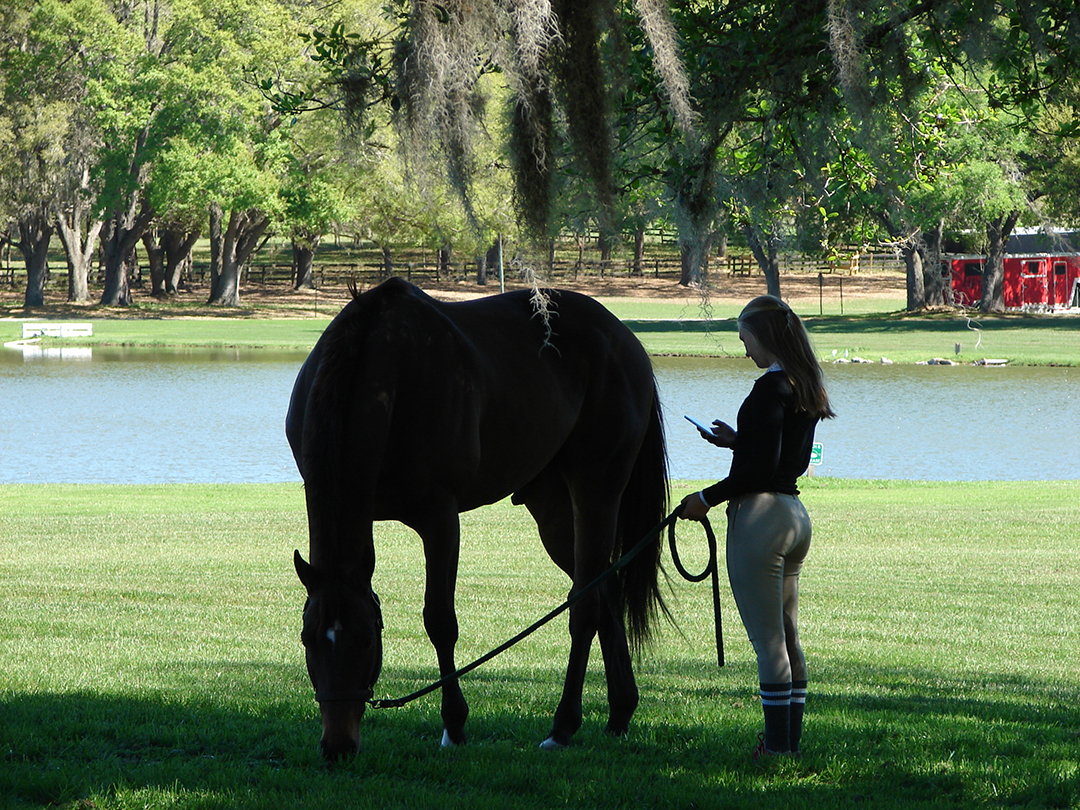Every once in a while, particularly during the winter months, someone will ask me “What’s up with that new Florida sales law.” *Sigh*
“That Law” is not new. It was put on the books in July of 2008. 2008!!!!
FAQ: “I am selling a horse in Florida. What do I need to know?”
Answer: Basically, the seller of a horse needs to know this: you are required to provide a written bill of sale. The bill of sale has to include very specific elements, as set forth in the law.
- The name, address and signature of the Purchaser, the Owner, or their duly authorized agents. (Yes, this means that someone from both sides of the transaction has to sign the bill of sale)
- The name of the horse, and its sire and dam if known
- The breed and registry status of the horse, if applicable and if known
- The age of the horse, if known
- The date of the sale
- The purchase price of the horse
- The following statement: “As the person signing below on behalf of the Owner, I hereby confirm that I am the lawful Owner of this horse or the Owner’s duly authorized agent, and I am authorized to convey legal title to the horse pursuant to this bill of sale.”
- The following statement: “As the person signing below on behalf of the Purchaser, I understand that any warranties or representations from the Owner of the Owner’s agent that I am relying upon in acquiring this horse, including warranties or representations with respect to the horse’s age, medical condition, prior medical treatments, and the existence of any liens or encumbrances, should be stated in writing as part of this bill of sale.”
FAQ: “Someone told me that the law makes it illegal to do shockwave or acupuncture, or even do joint injections within a week of the sale. Is that true?”
Yes and no. What the law requires is disclosure of certain treatments that occur within 7 days of a private sale. Subsection (10) provides: “an Owner or its agent that has subjected a horse to one or more of the following treatments within 7 days prior to the private sale of the horse or any interest therein shall disclose this fact to the Purchaser prior to the sale:
- Extra-corporeal shockwave therapy or radio pulse-wave therapy
- Acupuncture, eletro-stimulation, or both, with the intent or effect of altering laryngeal function of the horse.
- Internal blister or other injections behind the knee, which are intended to or which have the effect of concealing the true conformation of the horse.
- The use of any electrical or mechanical device designed or used to shock or prod a horse for the purpose of increasing the horse’s speed when it is being exhibited prior to sale, except for the use of a whip, spurs, or items otherwise permitted by the rules of the governing breed association, federation, or other regulatory body.”
FAQ: What does it mean for the breed and registry status of the horse to be “applicable”?
Good question. I interpret this to be a redundancy. It seems to me if the breed and registry status of the horse is not known then it is not “applicable”. I can’t really imagine a situation where it would be known, and not applicable. Arguably, the breed registry status of a gelding may not seem “applicable,” but how does a seller know that it won’t be “applicable” to the buyer at some point in the future.
FAQ: “I am only here for the season. Do I have to comply with this law?”
YES. Yes. And yes, again.
FAQ: “What if I don’t? What will happen? Will I go to jail?”
Whether you end up in jail is not something I can predict. However, you cannot go to jail for violating the provisions of this law, because this is not a criminal law. A violation of the law “resulting in actual damages to a person, shall be considered an unfair and deceptive trade practice.” What this means, is that if someone incurs “actual damages” as a result of your non compliance, then if they choose to file a civil lawsuit against you they can claim that your violation of this law was an unfair and deceptive trade practice… which would give them a basis for suing you for punitive damages and recovery of their attorneys’ fees.
FAQ: “Does the law actually require all commissions to be disclosed in the bill of sale?”
No. 5H-26.003 “General Requirements Relating to the Sale or Purchase of Horses”, subsections (2) – (7) address the disclosure requirements related to commissions. Basically, the law prohibits undisclosed dual agency. It also has disclosure requirements in the situation where an agent has an ownership interest in the horse as well. Certain facts and arrangements have to be disclosed in writing, but there is nothing that requires these disclosures to be made as part of the required bill of sale.
Importantly, there is nothing that requires each side to disclose to the other how much of a commission a principal is paying his/her agent.
FAQ: “I have a standard sales contract that I use, but it is two pages long and has a lot more stuff in it than what is required by the law. Do I need to have multiple documents, or merge them, or what?”
A bill of sale and a sales contract serve two different purposes. A sales contract has terms like payment terms, disclaimers of warranties, risk of loss, etc. If a horse is being sold pursuant to a sales contract, then it is best to have the contract signed PRIOR TO DELIVERING THE HORSE. It is possible to sell a horse without a sales contract, so the problem people run into is that sometimes the money changes hands, the horse gets delivered, and THEN the seller sends off the sales contract and wants the buyer to sign it. On the other hand, a bill of sale is really like a receipt for payment received. It is documentation that the transaction occurred — proof that the deal is done. It is fairly standard for a sales contract to include a provision to the effect of “upon receipt of payment and delivery of the horse, this agreement shall serve as a bill of sale.” In other words, you incorporate the bill of sale into the sales contract.
However, you can have two documents. There is not a single correct way to do it. I suggest merging the two documents into one, as that is simply less confusing to most people. But, for people who do not use a sales contract at all, then your “bare bones” bill of sale should meet the minimum requirements set forth above. It is also important to understand that the law does not prevent you from using a sales contract that includes additional terms or information than what is required by the law.
FAQ: “I sold a horse a while back and now the people want to send him back because I didn’t give them a ‘proper’ bill of sale. Really, the horse just didn’t work out for them and they are trying to figure a way to get their money back. What should I do? They are threatening to sue.”
Give them a bill of sale now. My question would be: what actual damages have they incurred due to the fact that you didn’t give them a bill of sale at the time of the transaction? Their dissatisfaction with the horse most likely has nothing to do with an absence of paperwork. Although the law is very clear that the bill of sale should “accompany” the transaction – which suggests temporal proximity – I think that giving them the documentation is a must. Better late than never.
You might wonder whether the absence of a bill of sale might ever result in someone incurring “actual damages.” However, when you think about it, the absence of a bill of sale might mean that they have trouble proving they own the horse, and this might make it difficult or impossible for them to sell the horse, lease the horse, or register the horse. In some cases, there may be tax implications. So providing a bill of sale is important for any number of reasons.
FAQ: “I am a trainer and sold a horse for a client a few years ago. The client rides with someone else now, but is asking for copies of my financial records related to the transaction. They say I have to give them this. Are they right?”
Yes. The law requires that “any person acting as an agent for a Purchaser or an Owner . . . shall, upon request by his or her principal or principals, furnish copies of all financial records and financial documents in the possession or control of the agent pertaining to the transaction.” If you are asked, you must disclose.
FAQ: “I am a trainer and in a deal I did my client paid me a commission for helping him sell a horse. Now the buyer wants to know how much my client paid me. Do I have to tell them?”
No. The law does not require disclosure of commissions unless there is a dual agency. So, you have to tell your own client how much you made on the deal (although, presumably they know), but you do not have to tell the other side.
FAQ: “I am a trainer and another trainer told me about a horse for sale. My client bought the horse, and I think I owe that other trainer a ‘tip’. Do I have to disclose that to anyone?”
Technically, it depends on how much of a “tip” you give the other trainer. If the tip is over $500, then you have to disclose the payment in writing. Arguably, you have to get your client’s written consent to pay the “tip.” The language of the law is rather confusing on this point, but the essence of it is that a payment to someone from other than that person’s principal (in an amount in excess of $500) must be disclosed and consented to in writing. So agents can be paid directly by their principal (client), but if the relationship between the person doing the paying and the person receiving payment is other than principal and agent, then the disclosure and consent provisions kick in. In fact, if you are going to pay this other trainer more than $500, you not only have to disclose it in writing to both the buyer and the seller, and you have to get their consent in writing, as well.
FAQ: “Someone told me that the law requires disclosure of all the horse’s veterinary records. Is that true?”
Yes and no. The law requires “when an Owner or its agent provides any medical information in response to an inquiry from a Purchaser or its agent about the medical history of a horse, the Owner or its agent shall accurately disclose all information within its knowledge that is responsive to the inquiry.” So, the seller of a horse doesn’t have to be completely proactive and volunteer disclosure of the horse’s complete veterinary history, but the point is that if you are asked, you have to be truthful to the best of your knowledge. Answer the question truthfully. But you don’t need to hand over all the records.
FAQ: “Has anyone used this law as the basis for filing a lawsuit?”
Yes.
©2021 by Krysia Carmel Nelson, Esq.








